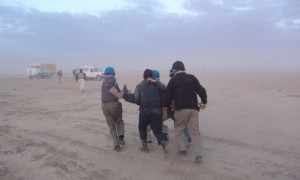REUTERS
At least 10 Iranian exiles were killed at Camp Ashraf in Iraq on Friday, a hospital source said, after security forces clashed with residents of the Iranian dissident camp north of Baghdad overnight.

An Iraqi government spokesman said five members of the Iraqi security forces were wounded in the incident at the camp where he said residents pelted security forces with rocks.
Representatives of the camp said 31 residents were killed and 300 wounded in what they called a “criminal attack.”
“There are 10 bodies of Iranians and 40 people wounded in the hospital, most of them killed or wounded by bullets,” a medical source at nearby Baquba hospital said. He requested anonymity since he was not authorized to speak to the media.
Ali al-Moussawi, Prime Minister Nuri al-Maliki’s media adviser, said fighting broke out after government forces tried to reclaim land from camp residents and return it to farmers who owned it.
“The forces tried yesterday … to give back these lands … They (Ashraf residents) objected to that, and clashes erupted. They assaulted the security forces, which led to a number of the residents and security personnel being injured,” he said.
The United States blamed the bloodshed on the government.
“Although we do not know what exactly transpired early this morning at Ashraf, this crisis and the loss of life was initiated by the government of Iraq and the Iraqi military,” State Department spokesman Mark Toner said in a statement.
Toner said the U.S. embassy and military in Iraq as well as the U.N. mission there had repeatedly urged top Iraqi officials to avoid violence, show restraint and treat the residents humanely.
Visiting U.S. Defense Secretary Robert Gates also called on the Iraqi government to show restraint, saying: “We’re very concerned with reports of deaths and injuries resulting from this morning’s clashes.”
Asked about any U.S. military role, he said nearby forces might offer medical help “but that’s about the extent of it.”
Amnesty International called on Iraqi authorities to launch an independent investigation immediately.
“Troops moved into the camp this morning and used excessive force against residents who tried to resist them, according to the information we have received,” the group’s Middle East and North Africa Director Malcolm Smart said in a statement.
“If true, this is very worrying. Whether they like it or not, the Iraqi authorities are responsible for the security and well-being of Camp Ashraf’s residents….”
SOURCE OF TENSION
Ashraf has been a sore point for Washington, Baghdad and Tehran for years.
The 25-year-old camp, home to some 3,500 people, is the base of the People’s Mujahideen Organization of Iran (PMOI), a guerrilla group that opposes Iran’s Shi’ite cleric leaders.
Iran, Iraq and the United States consider the PMOI a terrorist organization.
Iraqi government spokesman Ali al-Dabbagh said Ashraf residents threw rocks at security forces in what he called a “riot.” He denied troops had opened fire. “The security forces have pushed back residents of Camp Ashraf inside the camp by force,” Dabbagh said. “The situation is now controlled.”
The National Council of Resistance of Iran, the PMOI’s political wing, said Maliki ordered Iraqi forces to attack the camp in restive Diyala province about 90 km (55 miles) northeast of Baghdad, a remote location largely inaccessible to journalists.
“Forces under his command used Colts, automatic weapons and machine guns installed on armored vehicles to open fire on residents,” the group said in a statement.
Sunni dictator Saddam Hussein gave the PMOI shelter in Iraq and some of the group’s guerrillas fought with him against Iran. Iraq’s current government, which includes former Saddam opponents, has a close relationship with Tehran.
The group surrendered weapons to U.S. forces after the 2003 invasion of Iraq. The fate of Ashraf’s residents has been in question since Iraq took over the camp from U.S. forces in 2009 under a bilateral security pact.
Rights advocates said earlier this year the United Nations and the United States should take on protection of the camp to avert a tragedy which could lead to the deaths of residents.
Ad Melkert, U.N. special envoy for Iraq, urged the country at Friday’s Security Council debate to allow the United Nations UNAMI mission to monitor the situation at the camp.
(Additional reporting by Khalid al-Ansary in Baghdad and Missy Ryan in Mosul and Arshad Mohammed in Washington; Writing by Caroline Drees and Jim Loney; Editing by Louise Ireland and Deborah Charles)
http://www.reuters.com/article/2011/04/08/us-iraq-iran-ashraf-idUSTRE7375CM20110408